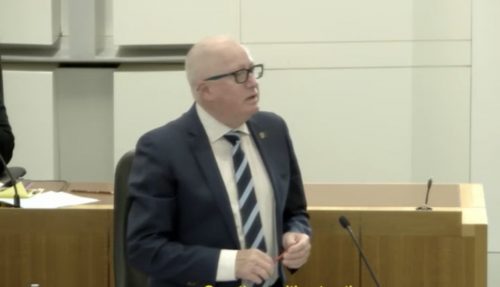
PAROLE processes have been so poor that the ACT Ombudsman adopted a manual that an inmate created after hearing about another detainee being denied release over having no fixed address.
The Ombudsman’s report has identified serious failings and issues that includes out-of-date and incomplete policies and cases where parole is denied for reasons that had no solutions.
The lack of a clear protocol at Canberra’s solitary prison has highlighted the government’s shortcomings this week inside the ACT Legislative Assembly.
“It is a ridiculous situation when a detainee cannot be released because they haven’t got accommodation, particularly when they can’t enter that accommodation because there is no release date,” Shadow Minister for Corrections Elizabeth Kikkert said.
The detainee had also been told during a parole hearing that housing could not be provided until after release from the Alexander Maconochie Centre.
The parole manual that replaced a lack of official advice on policy and mechanisms was created to detail the rights of inmates where most were unaware of the process.
It was described by the Ombudsman as a “comprehensive document with good tips”.
“It is stunning that it fell to an inmate to address this shortcoming, and is yet another example of the corrections minister outsourcing his responsibilities,” Ms Kikkert said.
Despite the government’s unwavering commitment to observing human rights as central to AMC management, such failures have already the potential to infringe on a detainees’ right to liberty under a Human Rights Act, the Ombudsman said in the report.
“Where release of detainees from custody is unnecessarily delayed, it also places added pressure on the already strained resources of the Alexander Maconochie Centre and the Sentencing Administration Board at the taxpayer’s expense,” the Ombudsman said.
The Ombudsman recognised the complexity of work involving in ACT Corrective Services’ administration of parole and “various challenges” at the AMC, including growth in detainee numbers, population diversity, resourcing and staffing limitations, and available systems functionality.
“This is a complex piece of work that will take time,” the Ombudsman said.
“Nevertheless, our investigation has identified room for improvement in the administration of parole processes in the ACT.”
The Ombudsman has given the ACT Corrective Services permission to adapt the manual with consultation of detainees that were involved in spelling out the protocols.
Minister for Corrections Mick Gentleman has hand-picked a committee to ensure that the 15 recommendations are implemented after reading the report.
Mr Gentleman denied accusations inside the assembly that the government have not been supporting ACT Corrective Services and that it fell to an inmate to “do his job”.
It followed the Labor-Greens coalition moving the motion to investigate matters of concern inside the Alexander Maconochie Centre that has been racked by numerous controversies.
Although the report fully supported the “holistic integrated offender management model, which seeks to enhance rehabilitation and integrative efforts”, feedback was not without a level of criticism over how the facility got to that point.
“It is of concern to our office that, despite this framework, ACT Correctional Services has been operating its parole and sentence management functions in the absence of a more comprehensive and transparent policy framework,” the Ombudsman said.
The Ombudsman’s investigation commenced following concerns being raised about:
- the information available to detainees about the parole process;
- the level of preparedness of detainees and the support provided to them, to participate in this process;
- the natural justice afforded to detainees during the parole application process and their access to legal representation
- the accuracy and completeness of information provided to the Sentence Administration
Board for it to consider when making decisions on parole applications.
The government had agreed with every one of the Ombudsman’s 15 recommendations that focuses on the creation and clarification of policy and procedure.
But despite adopting the recommendations, the government has still not committed to a full AMC policy and procedure review that it accepted back in 2018.
Who can be trusted?
In a world of spin and confusion, there’s never been a more important time to support independent journalism in Canberra.
If you trust our work online and want to enforce the power of independent voices, I invite you to make a small contribution.
Every dollar of support is invested back into our journalism to help keep citynews.com.au strong and free.
Thank you,
Ian Meikle, editor




Leave a Reply